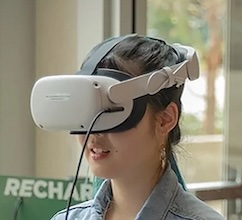 For the University of Oregon, Leila Okhata writes about new virtual reality research that shows how engaging people in stories told via 360-degree video or immersive virtual spaces increases their reported sense of closeness to an environmental problem that is not an immediate threat — in this case, coral bleaching — compared to showing them a non-immersive, 2D video. Those with the most immersive experiences also reported a greater willingness to engage in environmental action on the issue. Photo: Courtesy of the University of Oregon
For the University of Oregon, Leila Okhata writes about new virtual reality research that shows how engaging people in stories told via 360-degree video or immersive virtual spaces increases their reported sense of closeness to an environmental problem that is not an immediate threat — in this case, coral bleaching — compared to showing them a non-immersive, 2D video. Those with the most immersive experiences also reported a greater willingness to engage in environmental action on the issue. Photo: Courtesy of the University of Oregon
